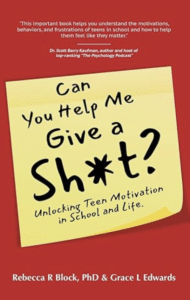Can you help me give a Sh*t?
31 July 2024
Talking with teens across the US revealed a profound disconnect between their school experiences and their genuine engagement. Many students shared stories about when and how school fell short, and what made a real difference when it didn’t. These conversations, paired with research in psychology and education, offer a roadmap for fostering lasting motivation in young people – not just the kind that leads to short, panic-driven bursts of productivity, but the kind that energizes them over the long haul.
Discover engaging stories and practical strategies to empower parents and educators to:
- Build Relationships That Support Sustainable Motivation: Establishing meaningful connections with students is key. Teens who feel understood and valued are more likely to engage deeply in their education. Show genuine interest in their lives, listen to their concerns, and offer consistent emotional support. Positive relationships create a foundation for lasting motivation.
- Encourage Student Voice and Agency: Autonomy is crucial for intrinsic motivation. Allow students to make decisions about their learning, such as choosing project topics or deciding how to present their work. Providing choices fosters a sense of ownership and personal investment in their education, empowering them to take control of their learning journey.
- Make School Feel More Relevant: Teens often disengage when they can’t see the relevance of what they’re learning. Connect academic content to real-world applications and their personal interests. An engaging curriculum that sparks curiosity can transform their attitude towards school, making learning feel more meaningful and applicable to their lives.
- Manage Screens’ Impact on Motivation: The pervasive presence of screens in teens’ lives can be both a distraction and a tool for learning. Help students find a balance by encouraging mindful screen use. Promote activities that limit screen time and emphasize face-to-face interactions and hands-on experiences, ensuring that technology enhances rather than hinders their motivation.
Promoting Lasting Motivation: Practical Insights
1. Build Positive Relationships
Creating a supportive and inclusive environment is essential. Encourage teachers and mentors to establish meaningful connections with students, showing genuine interest in their lives and providing emotional support. Collaborative learning experiences and group activities help build relationships and foster a sense of belonging.
2. Foster Autonomy
Encouraging self-directed learning is key. Allow students to set their own academic goals and create personalized study plans. Providing choices in their education helps them feel a sense of control and personal investment. This autonomy empowers them to take responsibility for their learning and develop important self-regulation skills.
3. Enhance Competence
Creating opportunities for students to experience success and recognize their progress is vital. Set achievable goals and celebrate incremental achievements to build confidence. Provide specific, positive feedback that highlights strengths and areas for improvement, fostering a growth mindset and encouraging continuous learning.
4. Connect Learning to Real-World Relevance
Develop an engaging curriculum that is relevant to students’ interests and real-world applications. Interactive teaching methods such as discussions, hands-on activities, and problem-solving exercises promote deeper understanding and retention of information. Making learning relevant sparks curiosity and intrinsic motivation.
5. Balance Technology Use
Help students find a balance with screen use by promoting mindful consumption of technology. Encourage activities that limit screen time and emphasize face-to-face interactions and hands-on experiences. Ensuring that technology enhances rather than hinders motivation is crucial for maintaining long-term engagement.
Motivating teenagers and young adults about school is a multifaceted challenge. By understanding and applying principles from psychology and education, we can create an environment that nurtures autonomy, competence, and relatedness. These strategies not only enhance intrinsic motivation but also contribute to the overall well-being and academic success of young learners. Through engaging stories and practical strategies, we can empower parents and educators to inspire the next generation to embrace education with enthusiasm and confidence. Don’t wait for systemic changes – start building lasting motivation today.

Dr. Rebecca R Block, an experienced educator and passionate advocate for student engagement, authored the book *Can You Help Me Give a Sh*t?* after speaking with teens across the country.
Her deep dive into the lives of these young people revealed a profound disconnect between their school experiences and their genuine engagement.
Many students shared stories about when and how school fell short, and what made a real difference when it didn’t.
Rebecca’s book combines these candid conversations with extensive research in psychology and education, offering a practical roadmap for fostering lasting motivation in young people. Her approach aims to cultivate the kind of motivation that sustains energy and enthusiasm over the long haul, rather than merely triggering short, panic-driven bursts of productivity.
Get the book on Amazon or order it directly from Becca here.
Becca’s website
Instagram
Facebook
LinkedIn




